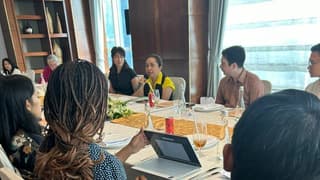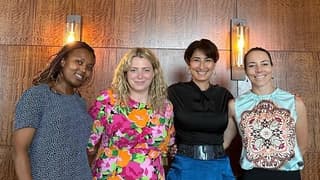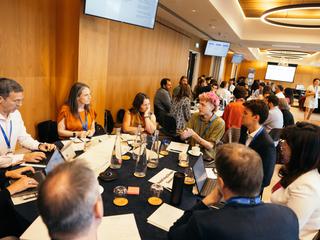Indonesia is the largest economy in Southeast Asia and the 16th largest in the world – and it’s expected to become the fourth largest by 2045, according to Bappenas (Ministry of National Development Planning Agency). It will also play a crucial role in the success of the Paris Agreement and the collective effort to limit global temperature rise to 1.5°C.
However, realizing this potential requires a consistent and ambitious approach to addressing climate challenges, to avoid locking in future emissions – and for Indonesia to remain economically relevant within the global community. Indonesia also needs substantial investment for its low carbon development, estimated at approximately $200 billion per year between 2021 and 2030, according to a study by Bappenas.
How can we unlock the private capital needed to meet these ambitions?
Climate Arc joined forces with Yayasan Visi Indonesia Raya Emisi Nol Bersih (ViriyaENB) and Climate Policy Initiative Indonesia to convene a participatory lunch discussion with key NGOs, think tanks, academia and climate finance experts to explore what solutions are needed. Four key issues emerged:
1. Addressing the plethora of competing standards
While appreciating new and emerging standards as a compelling effort to help companies and financial institutions reach climate and sustainability linked targets, the participants highlighted the importance of standards’ interoperability, comparability and utility for the market. Regulators and stakeholders must work together to harmonize these standards at country and global levels while acknowledging that the ISSB is a step towards this.

2. Building local capacity
There is a lack of understanding of the integration of climate risks both at project and sectoral levels, and hence the inability to factor this into financial decision making. It is crucial to enhance knowledge and expertise in this area. We discussed the need to develop mechanisms to educate and empower stakeholders, including government and the private finance community, on climate finance, and to build capacity within the broader financial ecosystem to mobilize private capital to climate-related projects.
3. Enhancing data transparency and availability
Data plays a critical role in facilitating progress. Together, we identified specific data types crucial for informed decision-making, such as data on physical and transition climate risks, data on projects aligned with climate pathways, and data on sectoral transition. We need greater transparency in data sharing to encourage organizations to disclose relevant information and make it readily accessible.
4. Making more informed investment decisions
Divestment from dirty assets is not the only viable sustainable investment strategy – engagement with corporates on their transition plan is essential. There is also a direct connection between climate risk and climate impact when making investment decisions and therefore a need to assess and understand the potential impact of climate-related risks. Net-zero-aligned investment requires catalytic capital for the climate transition, that is patient, risk-tolerant, concessionary, and flexible.


Next steps
The points above by no means captured a complete picture of transition in Indonesia, as some are related to structural problems that were not touched in the discussion. But the conversation did give a clear steer on the key areas that Arc works on, and we agreed that we can only meet the ambitions of the net-zero transition at the speed and scale required through radical collaboration.
There was overwhelming feedback that a climate finance ‘hub’ in the region would be helpful to meet these challenges and bridge these gaps.
We very much look forward to building on the insights shared and working together with local partners to bridge the gaps and overcome these challenges together.
Want to learn more?
If you would like further information on the hub development, please connect with us.



